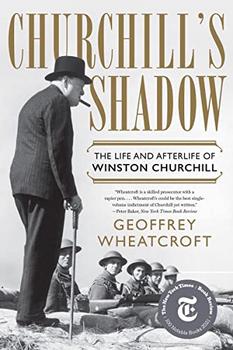Summary | Excerpt | Reviews | Beyond the Book | Readalikes | Genres & Themes | Author Bio

The Life and Afterlife of Winston Churchill
by Geoffrey Wheatcroft
A photograph taken in the south of France in 1937 shows Churchill standing between the seated figures of two of the few writers of the age even richer and more successful than himself, Somerset Maugham and H.G. Wells. And it was Wells who once said that an ideal biographer would be 'a conscientious enemy'. He meant that a hero-worshipper would be blinded by devotion to his subject, in a way that might even provoke adverse reaction in an uncommitted reader. That's indeed true of Churchill's own fiercely partisan biographies of his father Lord Randolph Churchill and his forebear the first Duke of Marlborough, and even truer of Churchill's many biographers, or hagiographers. 'Speak of me as I am; nothing extenuate,' said Othello, and yet many hero-worshippers have extenuated lengthily and evasively, on everything from Churchill's racism to his drinking, to the extent that he may even have suffered more from worshippers than from detractors.
In November 1940, Churchill gave one his greatest and most moving speeches, if now too little remembered, his elegy for Neville Chamberlain, who had died of cancer only six months after he resigned as prime minister. It was a very difficult speech for Churchill, after his sustained criticism of Chamberlain's policy only two years earlier, but he handled this in masterly fashion, praising Chamberlain for his sincerity and his honourable hopes for peace, 'the most noble and benevolent instincts of the human heart'. After dictating the speech to his secretary, he said slyly, 'Of course, I could have done it the other way round.' But then that's true of almost any story, not least Churchill's own. 'Give me the facts, Ashley,' he once said to a research assistant with wilful naughtiness, 'and I will twist them the way I want to suit my argument.' I trust that I haven't twisted any facts, but I'm telling a story, and I could have 'done it the other way round'.
At the same time, with all his immense renown, Churchill remains in some ways a mystery. He was the most famous man of his century, but one of the most elusive. We seem to know everything about him, and nothing. We know his quips and quirks, we know about his cigars and his champagne, his dragon dressing gown, his silk underwear, his velvet siren suits and his innumerable hats, his paintings, his pigs and his budgerigars. But do we know his inner essence? Books have been written about the meaning of Hitler , but what was the meaning of Churchill – or the reality?
'You know Winston has become a legend,' Churchill's wife said to his doctor in 1957, and many years later Umberto Eco was amused by a poll which found that more than a fifth of British children thought that 'Winston Churchill' was a fictional character. But Clementine spoke more truly than she knew, and those children weren't entirely wrong. A legenda was originally the life of a saint, and one later definition of 'legend' is 'an inauthentic story handed down by tradition and popularly regarded as historical'; not a bad description of the Churchill the world knows. He's part of our mental furniture, but in the same way that a fictional character is: part-Prince Hal and part-Falstaff, part-Sydney Carton and part-Mr Pickwick, part-Ben Ritchie-Hook and part-Ivor Claire. He has become a fabulous personage, like King Arthur or Robin Hood, who stands outside formal historical narrative and eludes it. When Sir Nicholas Soames was a little boy he went into his grandfather's bedroom and asked, 'Grandpa, is it true that you're the greatest man alive?' to be told, 'Yes it is. Now bugger off.' In a sense he has been saying that to all of us ever since, daring us to challenge the verdict.
Excerpted from Churchill's Shadow by Geoffrey Wheatcroft . Copyright © 2021 by Geoffrey Wheatcroft . Excerpted by permission of W.W. Norton & Company. All rights reserved. No part of this excerpt may be reproduced or reprinted without permission in writing from the publisher.
Your guide toexceptional books
BookBrowse seeks out and recommends the best in contemporary fiction and nonfiction—books that not only engage and entertain but also deepen our understanding of ourselves and the world around us.